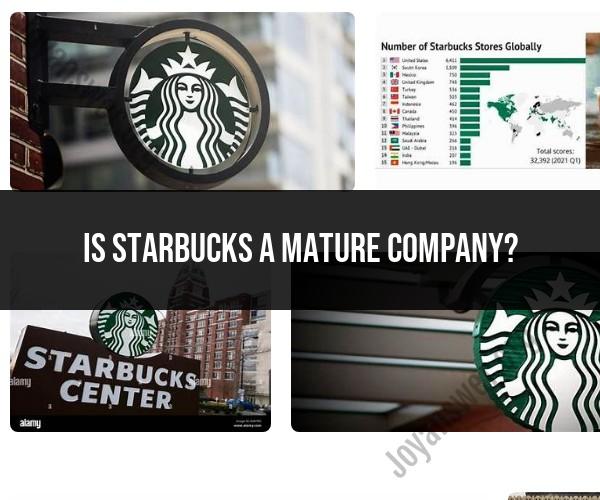Is Starbucks a mature company?
Yes, Starbucks can be considered a mature company in the business world. A mature company is typically one that has already gone through rapid growth and expansion and has established a significant presence in its industry. Several factors indicate that Starbucks has reached a mature stage:
Established Brand: Starbucks is a globally recognized brand, and it has created a strong brand identity over the years. The company is associated with premium coffee and a unique café experience.
Global Presence: Starbucks has a vast international presence with thousands of stores worldwide. It has successfully expanded into many countries, making it a well-established global player.
Diversification: Starbucks has diversified its product offerings beyond coffee, including tea, food, and merchandise. This diversification is often a characteristic of mature companies seeking growth in new areas.
Steady Revenue and Profit: Mature companies tend to have stable and consistent revenue and profit streams. While there may be fluctuations, Starbucks generally generates a steady income from its operations.
Market Saturation: In some markets, Starbucks has reached a level of saturation, where further expansion may be limited. This is often seen in mature markets.
Focus on Sustainability: Mature companies often prioritize sustainability, corporate responsibility, and ethical practices, which Starbucks has demonstrated through initiatives related to sourcing, environmental impact, and community engagement.
Competition and Market Share: Starbucks faces competition from various other coffee chains and businesses, indicating its presence in a mature, competitive market.
Innovations and Adaptations: Mature companies must continually innovate and adapt to changing market conditions. Starbucks has introduced new products, technology (like its mobile app), and store designs to remain competitive.
While Starbucks is considered a mature company, it doesn't mean it is without growth potential. Mature companies often focus on maintaining their market share, improving profitability, and exploring new avenues for expansion or diversification. Starbucks, for instance, continues to open new stores, innovate its menu, and expand into emerging markets. However, its approach to growth is more measured and strategic compared to a newer, high-growth company.
Starbucks as a Mature Company: An Overview
Starbucks is a multinational coffee company that was founded in 1971. It has since grown to become the world's largest coffeehouse chain, with over 30,000 stores in over 80 countries. Starbucks is a mature company, which means that it has reached a point in its development where its growth is relatively slow and stable.
The Evolution of Starbucks from Startup to Mature Business
Starbucks began as a small startup in Seattle, Washington. It quickly gained popularity for its high-quality coffee and unique atmosphere. In the 1980s, Starbucks began to expand nationwide, and in the 1990s, it began to expand internationally.
In the early 2000s, Starbucks experienced rapid growth. However, in the late 2000s, Starbucks began to face challenges, such as the economic recession and increased competition from other coffee chains. Despite these challenges, Starbucks has remained a successful company.
Challenges and Opportunities for Mature Companies
Mature companies face a number of challenges, including:
- Slower growth: Mature companies typically have slower growth than startup companies. This is because they have already penetrated most of their target market and because they face more competition.
- Innovation: Mature companies need to continue to innovate in order to stay ahead of the competition.
- Customer satisfaction: Mature companies need to maintain high levels of customer satisfaction in order to retain their customers.
Mature companies also have a number of opportunities, including:
- Brand recognition: Mature companies typically have strong brand recognition. This can give them an advantage over their competitors.
- Financial resources: Mature companies typically have more financial resources than startup companies. This can give them the ability to invest in new products, services, and markets.
- Established relationships: Mature companies typically have established relationships with suppliers and customers. This can give them an advantage over their competitors.
Starbucks' Strategies for Sustaining Success
Starbucks has implemented a number of strategies to sustain its success, including:
- Innovation: Starbucks continues to innovate by introducing new products and services, such as its Frappuccino drinks and its My Starbucks Rewards loyalty program.
- Customer focus: Starbucks is focused on providing its customers with a high-quality experience. This includes offering a variety of coffee drinks and food items, as well as comfortable seating and free Wi-Fi.
- Global expansion: Starbucks is continuing to expand globally. This gives the company access to new markets and new customers.
Starbucks' Impact on the Coffee Industry and Beyond
Starbucks has had a significant impact on the coffee industry. It has helped to popularize specialty coffee and has made coffee more accessible to people all over the world. Starbucks has also had a positive impact on the communities in which it operates. It provides jobs and supports local businesses.
Conclusion
Starbucks is a mature company that has successfully navigated the challenges of maturity. The company has implemented a number of strategies to sustain its success, including innovation, customer focus, and global expansion. Starbucks has had a significant impact on the coffee industry and beyond.











